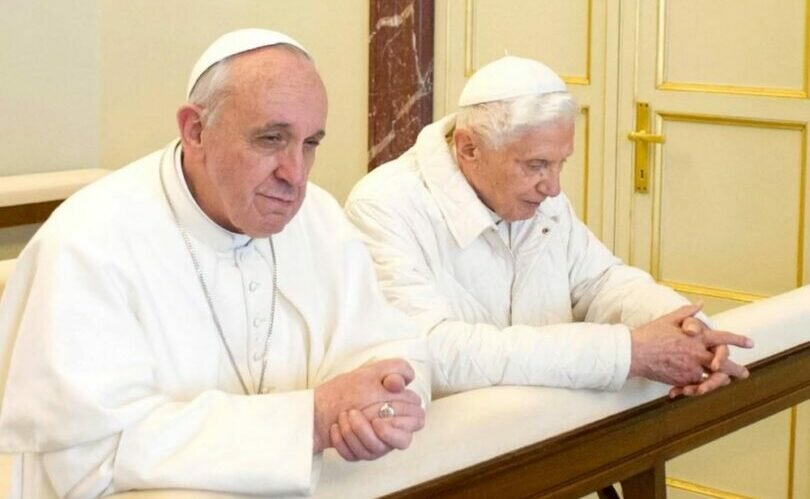July 4, 2018 (LifeSiteNews) – Today in the United States of America, it is, of course, Independence Day. But in many parts of the Catholic world, today was also (and in some places, still is) the Commemoration of All Holy Popes, a day on which to offer Mass in honor of the impressive band of saintly pontiffs, especially those who do not have a feastday of their own. It therefore gives us an opportunity to reflect on the phenomenon of those who fail to honor the dignity of the papal office and its saintly incumbents because they have a skewed vision of what the papacy is all about.
Today there are cardinals who tell us that the Holy Spirit is speaking through Francis. But what, one might ask, were the same prelates doing while Benedict was Pope—were they following the voice of the Holy Spirit speaking through Benedict? Were they rushing to the defense of Summorum Pontificum – the papal letter acknowledging the freedom of priests to offer the Traditional Latin Mass – as they now rush to the defense of Amoris Laetitia? Or was Ratzinger somehow “beyond the pale of polite society,” whereas Bergoglio is a new and definitive spokesperson of mercy? Perhaps the cardinals of the new paradigm have a secret instinct by which they recognize which popes are mouthpieces of the Spirit and which ones are not.
In reality, we are seeing here an obvious case of a double standard. If the pope is progressive, he is the oracle of God. If he is traditional, he is a stick in the mud, a carryover, a relic of the past, regressive, nostalgic, hard-hearted, rigid, on the wrong side of history. In this way, a personal agenda is allowed to serve as the actual magisterium, or the magisterial filter that strains the gnat of Summorum but swallows the camel of Amoris.
Some have accused traditional Catholics of a similar double standard. They say we do the same thing: we exalt Benedict and hold Francis at arm’s length. But this is not true. A traditional Catholic avoids the dilemma altogether because he is not an ultramontanist to begin with, who thinks that popes should be blindly followed in whatever they say. His allegiance is first and always to Sacred Scripture, Sacred Tradition, and the clearly and solemnly articulated Magisterium of all the centuries. He knows that these and these alone are the things permanently binding on every member of Christ’s faithful, including—and perhaps especially—the Pope.
Thus, it is no inconsistency for a traditionalist to say: “Benedict XVI was a better pope than Francis,” because his reasoning is: “Benedict followed more closely the teachings and traditions handed down from the past, whereas Francis departs from them in many and notable ways.” It is not at all about pitting one pope against the next, but rather, about seeing all the popes as defenders of the deposit of faith and servants of the servants of God.
Then there is the phenomenon of “selective adulation” in the practical realm. The same people who clamored for the washing of women’s feet, which they finally got (if only for the Novus Ordo), would never dream of emulating Pope Francis’s use of the so-called Benedictine altar arrangement, that is, the six (or seven) candlesticks and crucifix that surmount the papal altar. That is, even their devotion to the Great Leader has arbitrary limits. A progressive will follow the progressivism of the Pope but not his occasional traditional examples. By so doing, they once again show their hand.
Many have said in recent years that the Church is facing another crisis like that of Arianism in the fourth century, only ours is much worse because, in its modernist inspiration, it undermines the very notion of dogma and the very essence of revealed religion.
A colleague of mine once said that our crisis today is not like that of Arianism because we are not dealing today with an obvious denial of doctrine, but with squishy ambiguities and tergiversations. But I am not convinced that this is true, since there are binary questions that face us, and that we cannot avoid answering. One answer proves a man a Catholic, the other shows him an unbeliever.
1. Do you accept doctrinal continuity or not—that is, do you think it matters whether or not contemporary papal and episcopal teaching conforms to that which, in the past, was laid down authoritatively as always and everywhere true?
2. Do you hold there are exceptionless moral rights and wrongs, that is, things that must always be done, and things that must always be avoided, regardless of any and every circumstance? Do you hold that there are precepts we must obey in order to be saved? Is there any good that would justify the committing of some evil, or would make it not evil? Can one ever sin for the sake of a greater good?
3. Is the Pope the guardian of Catholic tradition, or its master and lord?
Each of these questions allows only a yes or no answer. Some in the Church answer one way, some answer the other way. This divides them as much as the divinity of Christ divided the Catholics from the Arians. And there are plenty who are sitting on the fence, trying not to answer the questions, just as there were equivocators and temporizers in the fourth century. But anyone who does not answer rightly a question to which the right answer is already definitively known is condemned as if he were a staunch defender of the wrong answer.


